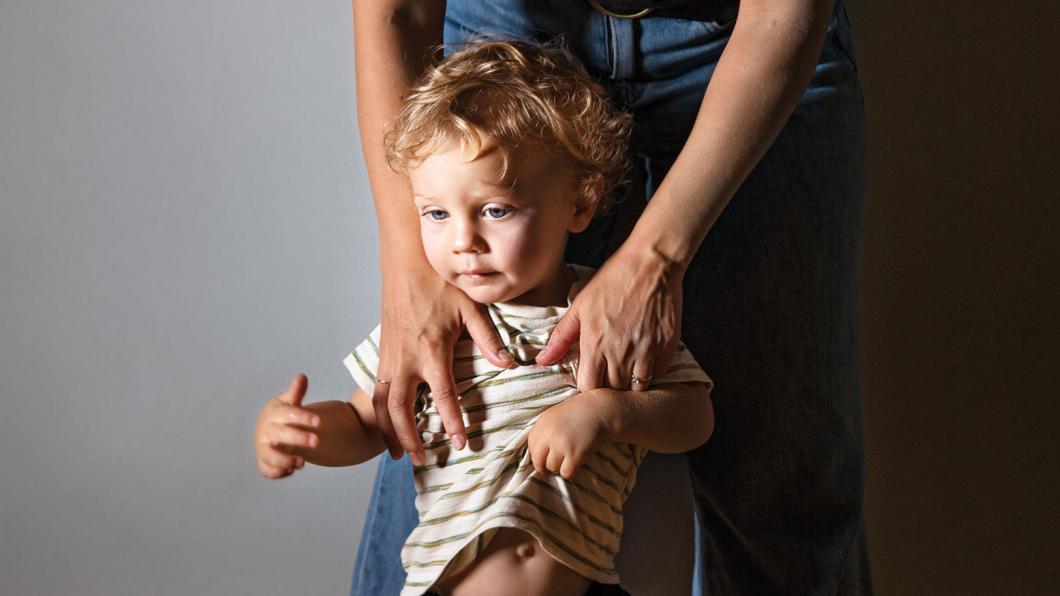
This parent's essay didn't sit right with me
Photo by Elinor Carucci in The Cut
By Louise Kinross
On Sunday, I clicked on this piece in New York Magazine: Every Parent Wants to Protect Their Child. I Never Got the Chance.
There’s this adorable image of a toddler who appears healthy, but who, we learn, has cystic fibrosis (CF). CF is a progressive genetic disease that causes damage to the lungs and digestive system. It shortens life, although some people with the condition are living into their '40s and '50s.
His mother, Jen Gann, says she chose to have prenatal genetic testing while pregnant because “if something were wrong,” she would abort.
Due to human error, Gann never received the results, which showed she was a carrier for the CF genetic mutation. That meant her husband wasn’t advised to get tested. He also is a carrier. They found out their son Dudley has cystic fibrosis when he was a few weeks’ old.
The rest of the piece is about the intense guilt Gann experiences and her decision to sue her health providers in a case of wrongful birth.
I feel empathy for Gann. Every mother hopes she will be lucky enough to give her newborn child a clean slate at life.
Perhaps where we differ is that I don't view my child's health as an entitlement guaranteed through science. I have a son with a rare genetic condition. After he was born, I stopped counting the number of doctors who said: “But he had a normal amnio!”
Gann's piece is problematic for me in a couple of ways.
At one point she envisions telling her older son: “I’m sorry I didn’t save you, from your own life.”
Oddly, we don’t hear from any adults with cystic fibrosis in Gann’s piece, people who could speak firsthand to the complexities of their lives. Will Dudley grow to wish he were not alive? Does his opinion, when he’s able to render it, matter?
Instead, we read about a conversation Gann had with Dortha Jacobs. Jacobs established the legal concept of wrongful birth in 1975, when she sued her doctor for not diagnosing her rubella when she was pregnant with her daughter Lesli. As a result, Lesli was born with severe disabilities.
This is where I felt an editor should have applied the brakes.
Lesli isn’t offered any agency in the piece. Gann says Lesli lives in supported housing, can’t see, hear, talk or walk, has intellectual disabilities and has had over 20 surgeries. “It’s a life sentence,” is how her mother Jacobs describes her parenting experience.
I empathize with the challenges experienced by Jacobs and her daughter, and the struggles Gann anticipates with her son. But nothing about disability, or illness in the case of CF, is ever black or white.
We aren't told about how Lesli communicates. Why do we not hear from this marginalized person, or from other people with disabilities?
Gann says if she’d gotten her test results, she could have chosen to get pregnant using IVF to ensure a healthy embryo. She then asks: “Would I still have made Dudley, this exact son, only without his disease?”
Well, uh, no. Her son Dudley was the son that she would have terminated, prior to trying again with IVF. Another child would have been another child.
And that’s the sticking point, isn’t it? When a child is born with a disability or chronic health condition, it’s part of their identity. It doesn’t sit, like an inert blob, separate from the human being. It’s a part of all of their experiences, good and bad, part of the way they see the world and interact with it.
Jacobs says she’d like to replace the term “wrongful birth” with something like “parental choice.”
What about choice in how we live our lives with our children, in the here and now?
Today I listened to Keith McArthur's podcast with Fabiana Bacchini, author of From Surviving to Thriving. McArthur, who writes The Instruction Manual, is dad to a son with a rare genetic condition. Bacchini struggled with infertility, then got pregnant with twins. One child died in utero, and the other was born severely premature, with many complications, and later diagnosed with cerebral palsy.
This line from Bacchini stuck out: “You have to be making a choice everyday, a conscious choice, that this is a good journey, despite the hardness and sadness and the unknown.”
That's the one choice we all have.